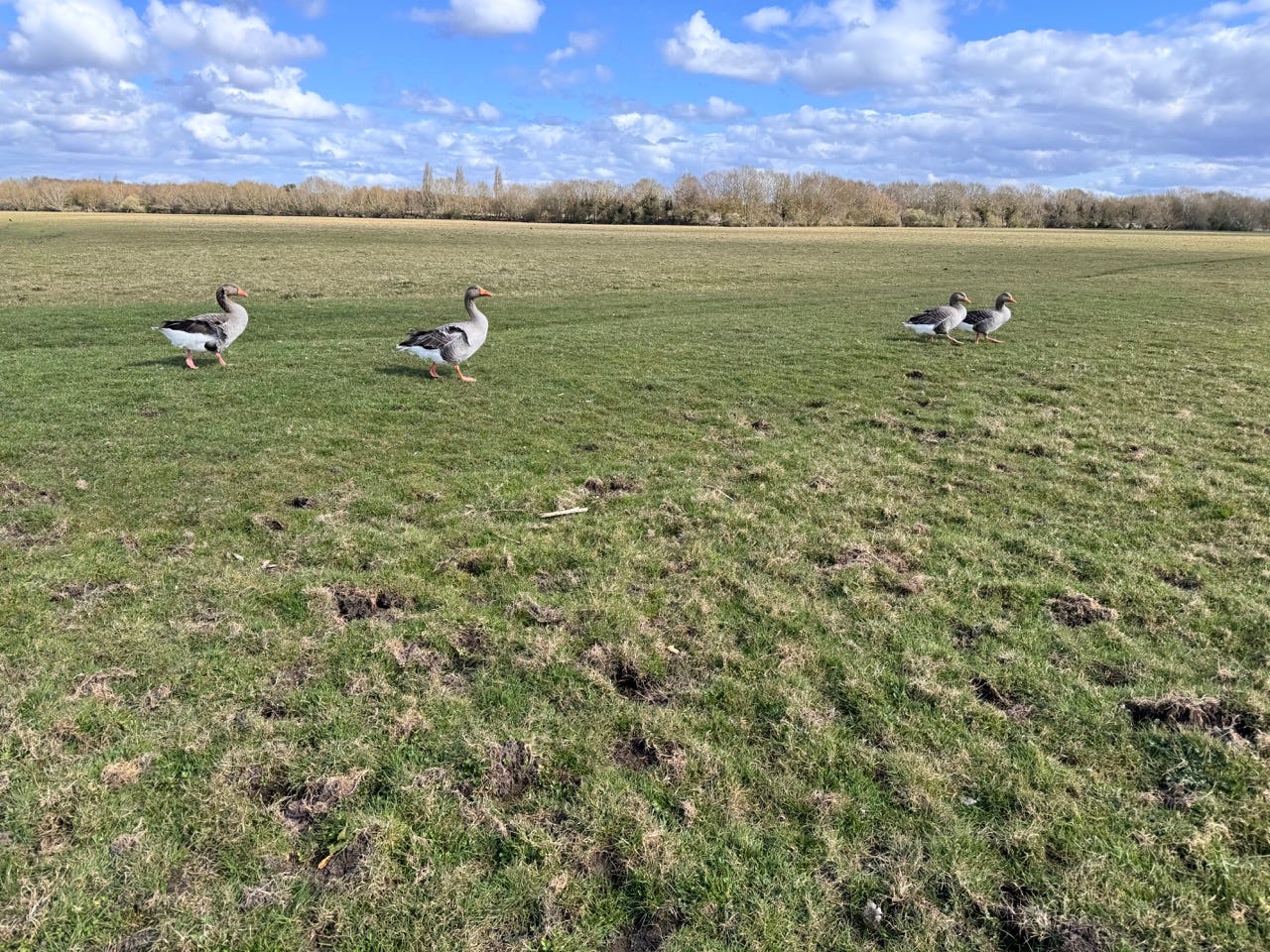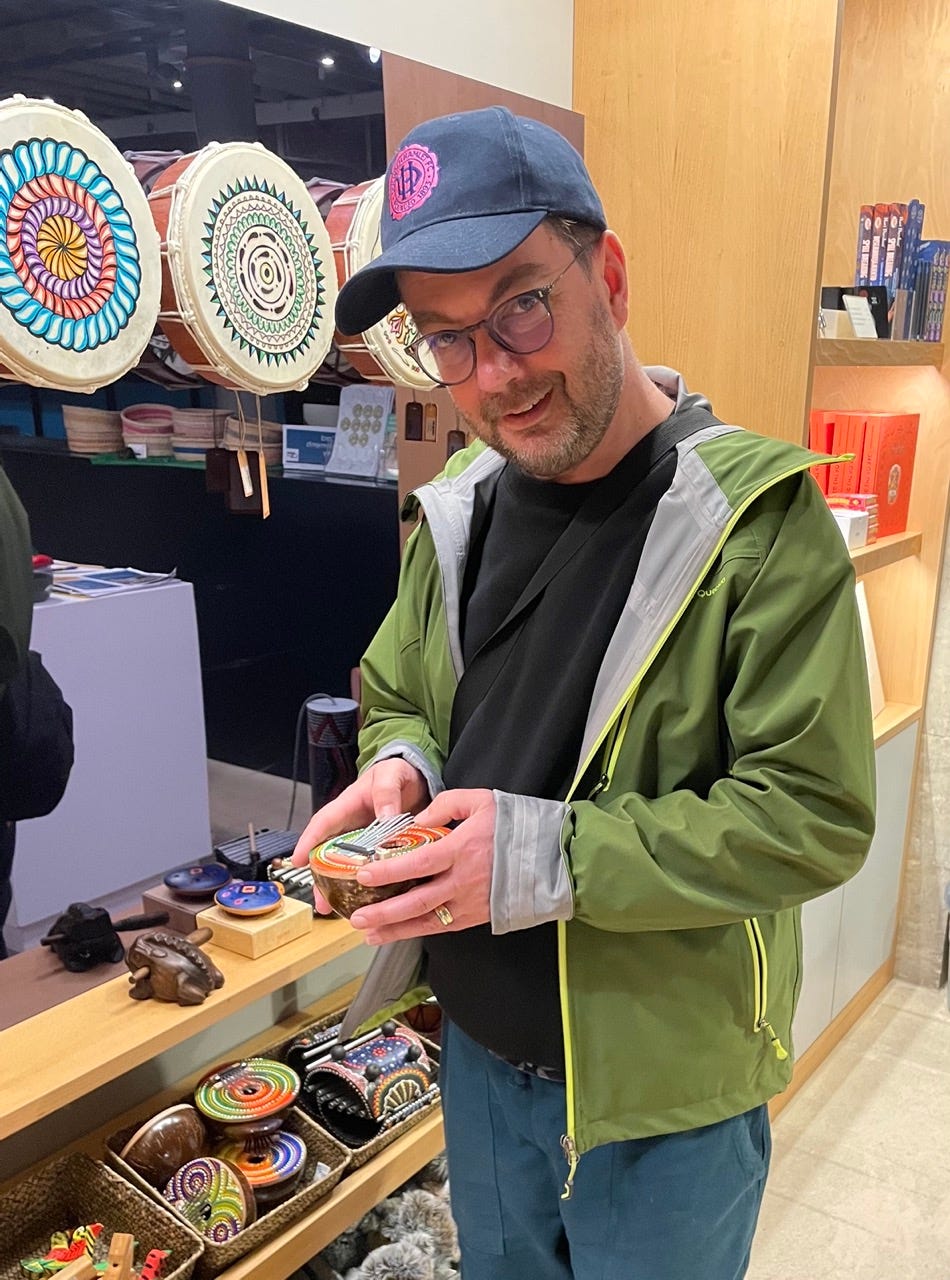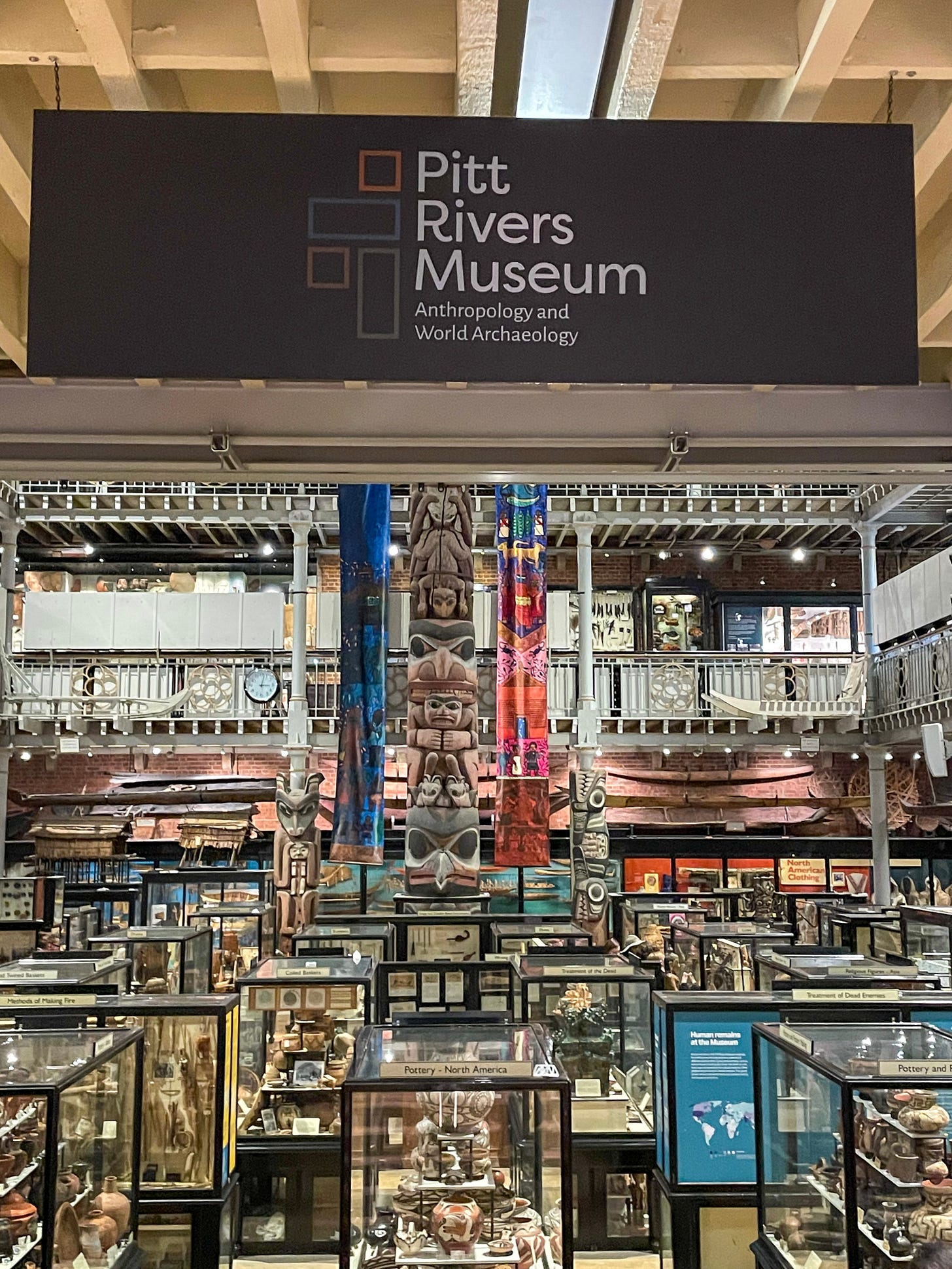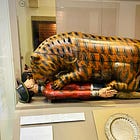Walking with Nick Parker, writer
The tone of voice master on curiosity, movement, learning and experimenting
“I love all kinds of walks – big mountain walks, getting lost in city walks, familiar walks, exploring new places walks. But I like them most of all when I’m having a really good conversation at the same time.”
Hello walkers and writers 👋
If you’re a copywriter, or in any way interested in how brands speak and where they get their voices from, then chances are you’ve heard of Nick Parker. He’s spent years delving into language, unpicking the stitching to see how it all works, then using his knowledge and talent to help the brands he works with. He’s had a brilliant career, from deputy editor of The Oldie to strategy partner at The Writer, to setting up his own language studio. He’s helped hundreds of brands find their voice, trained thousands of people and writes the brilliant Tone Knob newsletter where he geeks out about brands that are doing interesting things with their voice and language.
Endlessly curious, always experimenting with new things, Nick’s what you might call a *whispers* polymath. Except he probably wouldn’t use that word cos it’s a bit fancy, innit.
As fellow brand writers, we kinda move in the same circles, except we’ve not worked together directly and haven’t had the chance to chat much about writing. Nick’s done lots of interviews, podcasts, talks and conferences – where the focus is usually on brand tone of voice. So I thought it’d be interesting to peel back the layers to find the source of all that creativity. Where does it come from, what does it eat? And why?
We met for a brand ramble aka a Bramble (trademark pending) in Oxford to find words in the wild. Our walk took us along the canal, through Port Meadow, St Sepulchre’s Cemetery in Jericho and into Blackwell’s. We also strolled around the Pitt Rivers Museum where we had a fascinating chat with a curator about magic, witches, totems and wands, and I showed Nick my favourite ever museum object – a silvered glass bottle said to contain a witch.
We had a brilliant time putting this interview together for you and hope you enjoy it.
Hiya Nick, thanks for ‘walking n talking’ with me. We’ve known each other a while, so for the benefit of our readers, please introduce yourself
I live just outside Reading, in Berkshire. By the Thames. It’s very pretty. There are lots of walks. In fact, it’s the sort of place people come on holiday to do a bit of walking. I grew up in a city so that always catches me out.
I say I’m ‘mostly, a writer’. I worked in magazine publishing, then at a creative agency, now I work for myself. I’ve tried all sorts of other titles (‘language strategist’, ‘creative consultant’ etc) but they always feel a bit try-hard and I invariably end up back at ‘writer’.
You spend a lot of your time helping brands find their voice. Have you ever found the lines blurring between your own voice and someone else’s, or felt that you’re losing yours because you’re often writing as other people or brands?
Oh, that’s an interesting question. My instinctive answer is that no, I don’t find the lines blurring: I think I’ve always had a fairly good sense of my own voice – of the sorts of perspectives that I like to take on things, and the ways I like to talk about them (which is mostly about how I use humour, I think.) And although I’ve written in lots of different voices for my clients, I actually tend not to get asked to do funny stuff very often.
That said – there’s a directness to most copywriting – of knowing why you’re writing, where you’re going, and what the pay-off for the reader is – and I think that directness has become part of my own voice. I notice when I do other types of ‘creative’ writing – fiction or poetry – that I can’t shake that directness.
Though thinking about it, I wrote most of the short stories – which are all under 2,000 words, often only a page or so – in my book The Exploding Boy before I worked as a copywriter. So maybe directness is just me, after all.
“I’m happiest when I’m making something – and that can be a bit of writing, a drawing or painting, playing music, making food, making something out of wood, whatever. Days where I’ve used my hands and ‘made a thing’ are the days that feel well spent.”
You’ve spent years learning to sing. Has it taught you anything about tone of voice, and have you changed your approach as a result?
Ha! Yes. I have. It’s been a long, weird journey: I had an awful, tuneless, strangulated sort of voice. If I ever had to sing in public, I’d just mime. But I really wanted to be able to sing – people who sing seemed to be having the best time!
And also for some reason that I can’t explain, I had this strong sense that singing was something I was supposed to be able to do! So over the last ten years, I’ve been slowly, slowly, learning to sing: every couple of years I’d have a few lessons, and verrrry gradually, it started to come together. The last couple of years I’ve been singing at open mic nights, which has helped enormously. I’m not great, but people don’t wince like they used to.
To be honest, I don’t think it’s taught me much about ‘voice’ – but it has been a huge lesson in the power of incremental change. It’s basically been a decade. That’s an absurd amount of time really. Yet I kind of did it ‘with hope, but without expectation’ and enjoyed the journey for what it was, and all of a sudden here I am. I think part of the reason I still talk about the ‘journey from not being able to sing’ is that I haven’t quite got my head round the fact that I can just do it now.
And what’s your favourite song to sing?
The Book of Love, by the Magnetic Fields. Greatest love song ever written.
“There’s a directness to most copywriting – of knowing why you’re writing, where you’re going, and what the pay-off for the reader is – and I think that directness has become part of my own voice.”
You’re constantly learning and experimenting with creativity. What does living a creative life mean to you?
I think there’s a few things going on for me. Partly, I’m just happiest when I’m making something – and that can be a bit of writing, a drawing or painting, playing music, making food, making something out of wood, whatever. Days where I’ve used my hands and ‘made a thing’ are the days that feel well spent.
Also – I’m just really drawn to learning new stuff. I love the moment where the fog of confusion and ineptitude lifts and you’re like oooh, I get it now. And I like the practice of often being in ‘beginners’ mind’.
I did a project where I learned to play the trumpet in a month, to play at a festival called Inexpert. I learned origami during lockdown. A couple of years ago I taught myself to make furniture out of scaffolding planks. Sometimes it’s just small things – like teaching myself to whistle using my fingers, or doing a proper wheelie on my bike.
It’s one of the best things about the internet is that you can both learn to do almost anything from YouTube, and – even better – you can find a teacher for almost anything. I’m gonna have a lesson to learn the basics of playing the musical saw in a few weeks. How cool is that?! (OK, not cool at all. But you know what I mean).
There’s a balance, though. It’s easy for me to always be finding new things to do. At the moment, I’m trying to ‘start from what’s here, rather than what’s absent’, if that makes sense.
What creative ‘thing’ are you most proud of doing, and why?
I think it’s always the thing I’m working on at the moment! Once something’s done, it feels obvious and inevitable. I was pleased with the little book On Reading. The idea came unexpectedly, and – because I broke my leg and was laid up! – the process of writing it was enjoyable. Putting it out into the world has sparked so many great conversations, new friendships, etc.
(Sarah’s note: On Reading is a gorgeous book that fits perfectly in your pocket.)
Any tips on what people can do to get more play and creativity into their life?
Oh – find other people to play with! It took me ages to realise this. I used to just chug away at things by myself, which is fine but… lonely! The cartoonist Lynda Barry says of drawing that it’s a ‘solitary activity that we must do together’ – and I think that’s true of most creative things, even ones that at first glance might seem like ‘solo activities’. A month in a band beats years of solitary music practice. A book club. A sewing circle. A writing group.
“I’m really drawn to learning new stuff. I love the moment where the fog of confusion and ineptitude lifts and you’re like oooh, I get it now.
You’ve been working on being more ‘in your body’ in recent years with things like pilates and yoga. It seems like movement/exercise was something you previously avoided, so I wondered if it’s brought any unexpected benefits other than physical health?
Ha, that’s true. Not unlike singing, in fact. I was always very ‘disconnected’ from my body, and very inflexible. Then I started to get a bad back. And exactly like singing, actually – I now have a much stronger sense of being an ‘integrated whole’.
I think being a writer got me stuck in my head too much. I’ve realised I’m most content when I can take ‘short forays’ into my head. If ever I’m feeling out of sorts – particularly if I’m feeling anxious – it’s often just because I haven’t been up and out and moving enough. I feel like I re-learn this lesson every few months!
Sticking with the theme of movement, what role does walking play in your writing life?
I’m a sort of practical walker, I think: I tend to do purposeful ‘A to B’ type walking (like not taking the tube in London, but walking wherever I need to go.) And also a ‘walk-and-talker’ – walking is a great ‘problem-solving technology’. Either talking to yourself, or with other people. I love all kinds of walks – big mountain walks, getting lost in city walks, familiar walks, exploring new places walks. But I like them most of all when I’m having a really good conversation at the same time.
Curiosity seems to be the thread that connects your creative pursuits from writing and drawing, to music and movement. There’s bound to be times when you come across something and think ‘meh’, even if it’s just occasionally. So when that happens, what do you do to reignite your curiosity and interest?
Oh, I just go and do something else for a bit. I think we all have ‘seasons’ of interest in stuff. I think the knack is to have different interests for different times. Outdoors in the sun stuff. Indoors by the fire stuff. Stuff that stretches your brain. Stuff you can do on autopilot. Stuff you do with others, stuff you do alone…
I’m aware that I sound like a slightly frenetic ‘always learning!!’ kinda person. The reality is much slower than that. Most of the things – music, art, singing, movement – ebb and flow, there are years on and years off.
What’s your walking style?
Definitely Walk n Talker!
Headphones or head in the clouds?
I’ve always wanted to be a ‘walk-and-podcast listener’, and quite often I’ll dig out an interesting sounding podcast and head out for a lunchtime walk… then after about 5 minutes I’ll find I’ve taken my headphones off! There’s something a bit claustrophobic for me about headphones. I like to hear what’s going on around me.
If you could take a walk with anyone, real or fictional, alive or gone, who would it be?
I’d like to walk n talk with my parents – they both died fairly young. I’d love a walk n talk with them.
“Walking is a great ‘problem-solving technology’. Either talking to yourself, or with other people.”
One word round
One thing you always take with you on a walk? Herbals. (Actually, not always, but as often as possible. They’re the taste of North Wales mountains to me!)
One word to describe how you feel about writing? Essential.
One word to describe how you feel about the trumpet? Joyful.
I usually ask writers to share a walking-inspired writing prompt, but let’s flip that on its head – can you share a writing-inspired walking prompt for our readers?
Just before you head out for a walk, grab a book at random from your shelf and read a page or two. Use this as the stimulus on your walk. You might talk about it with someone else. You might just mull it over in your own mind. You might use it as something to respond to with your own writing. I find that this gives a walk a distinctive ‘inner landscape’ that makes them memorable.
Thanks for walking and talking with me, Nick – and for indulging me in my intrigue with witches trapped inside silvered bottles.
You can learn more about Nick’s work on his website where you can also get hold of his book, On Reading, and you should definitely sign up to his newsletter, Tone Knob, for all things brand and voice.
I’ll leave you with this final tip from Nick on creativity:
“Find other people to play with! It took me ages to realise this. I used to just chug away at things by myself, which is fine but… lonely. Most creative things, even ones that at first glance might seem like ‘solo activities’. A month in a band beats years of solitary music practice. A book club. A sewing circle. A writing group…”
Happy walking and writing until next time.
Sarah
More from The Writer’s Walk
Follow in our footsteps with a wander around a museum.










Great questions, Sarah!
Love this interview with the awesome Nick Parker. We once spoke on the same Copy Cabana bill - bits of his TOV talk are still with me after nearly 10 years. And this bit from above is brilliant:
"I usually ask writers to share a walking-inspired writing prompt, but let’s flip that on its head – can you share a writing-inspired walking prompt for our readers?
Just before you head out for a walk, grab a book at random from your shelf and read a page or two. Use this as the stimulus on your walk. You might talk about it with someone else. You might just mull it over in your own mind. You might use it as something to respond to with your own writing. I find that this gives a walk a distinctive ‘inner landscape’ that makes them memorable."
It's really similar to something I've been thinking about for a talk on curiosity... so I'm sort of pinching and adapting a bit.
Inexpert sounds great! Sad to have narrowly missed it by *checks notes* 7 years.